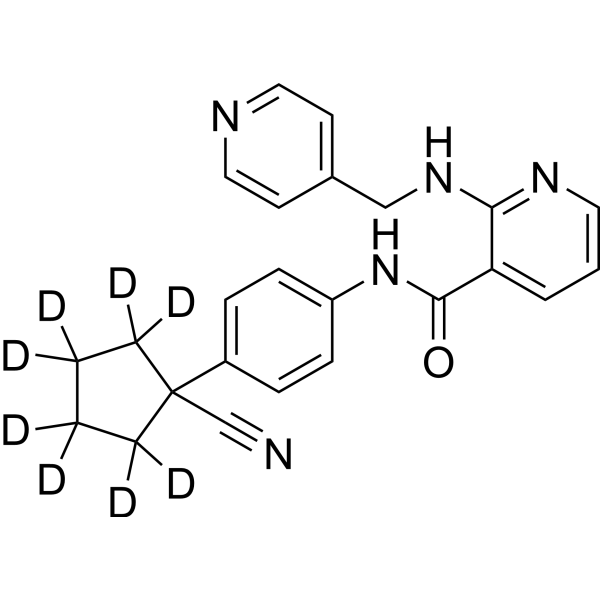Apatinib-d8 free base
Modify Date: 2024-01-10 19:30:06

Apatinib-d8 free base structure
|
Common Name | Apatinib-d8 free base | ||
|---|---|---|---|---|
| CAS Number | 2468771-43-7 | Molecular Weight | 405.52 | |
| Density | N/A | Boiling Point | N/A | |
| Molecular Formula | C24H15D8N5O | Melting Point | N/A | |
| MSDS | N/A | Flash Point | N/A | |
Use of Apatinib-d8 free baseApatinib-d8 (free base) is the deuterium labeled Apatinib free base[1]. Apatinib free base (YN968D1 free base) is an orally bioavailable tyrosine kinase inhibitor, which selectively targets VEGFR-2 (IC50=1 nM). Apatinib free base (YN968D1 free base) is an anti-angiogenic drug for the treatment of advanced or metastatic gastric cancer. Apatinib free base (YN968D1 free base) potently inhibits Ret, c-Kit and c-Src with IC50s of 13, 429 and 530 nM, respectively. It also inhibits cellular phosphorylation of VEGFR-2, c-kit and PDGFRβ[2][3][4]. |
| Name | Apatinib-d8 free base |
|---|
| Description | Apatinib-d8 (free base) is the deuterium labeled Apatinib free base[1]. Apatinib free base (YN968D1 free base) is an orally bioavailable tyrosine kinase inhibitor, which selectively targets VEGFR-2 (IC50=1 nM). Apatinib free base (YN968D1 free base) is an anti-angiogenic drug for the treatment of advanced or metastatic gastric cancer. Apatinib free base (YN968D1 free base) potently inhibits Ret, c-Kit and c-Src with IC50s of 13, 429 and 530 nM, respectively. It also inhibits cellular phosphorylation of VEGFR-2, c-kit and PDGFRβ[2][3][4]. |
|---|---|
| Related Catalog | |
| In Vitro | Stable heavy isotopes of hydrogen, carbon, and other elements have been incorporated into drug molecules, largely as tracers for quantitation during the drug development process. Deuteration has gained attention because of its potential to affect the pharmacokinetic and metabolic profiles of drugs[1]. |
| References |
| Molecular Formula | C24H15D8N5O |
|---|---|
| Molecular Weight | 405.52 |